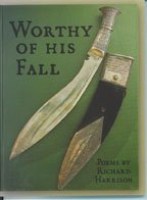Like the kukri knife that adorns its cover, the poems of Worthy of His Fall by Richard Harrison are keen, precise, and dangerous. His political poems are not meant to be, nor are they, beautiful: “This is a political poem, so / don’t expect beauty” (“Warnography” 1-2). Unfortunately, the political poems make unwieldy weapons. They entrench themselves in the language of the war on terror, name-dropping Bush and Rumsfeld, bin Laden and Hussein. The language, to use Di Brandt’s words (from the back cover) to refute her own comments, is “militant patriarchal monotheism.”
The speaker attempts to reconcile modern ideas of fatherhood with what he learned from his own father. In “Song for the Lesser Giant,” he quotes his daughter singing “a song of all things / missing their essential parts” (2-3). At the end, he chooses to italicize “a father without the yell” (33) as if to emphasize that he cannot conceive of being a father without raising his voice. The voice of the speaker’s father also appears in other poems, at one point informing the reader that “Anyone who marches is an army.” In the poem of the same title, the speaker describes a “father on TV pointing / towards his bombed-out house” who, despite
all the terms
this man could choose to send his message
to what remains of the world as he passes
before its bottled eye, he chooses the political.
(29-30, 32-35)
The speaker seems to criticize the father on TV for choosing the political, but is guilty of the same sin, adopting the language of conflict, opposition and war from his own father. The “militant patriarchalism” of the political poems is the downfall of this volume.
It is in the non-political poems, those about fatherhood, love, and spirituality, where the book, like the knife — “Notched at the hilt / where the priest had let the sacred in” (“On My Father’s Hands” 24-25) — is to be seen as something unique and extraordinary, to be exalted. As much as the speaker, in various poems, wrangles over the role of the father, the meaning of faith, the inability of words to truly capture what they describe, he finds certainty in the indestructible elements of life — birth, love, death. In “Heaven,” the speaker imagines his father in the bath, “alone and naked / in the water, ready for his heaven” (9-11). Whether heaven exists or not, whether his father lived rightly or not, is unimportant. The poet boldly creates heaven with his hand, and into it he allows his father to slip.
Harrison reveals beauty in death and we understand there are some things that can only be captured in words, and in times of war it is in the sanctuary of these words — love, faith, heaven — that we find whatever solace we can.

